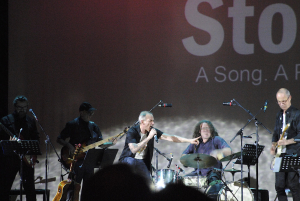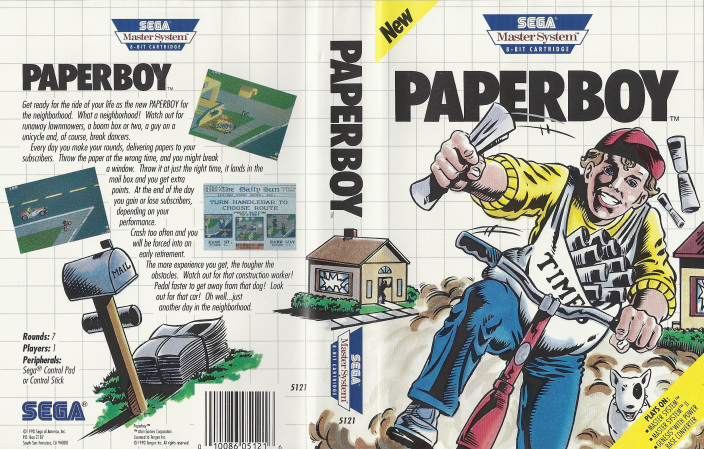
“Deranged paperboy delivers papers to the wrong houses. More at 11…”

Chucky puts down the knife to earn some scratch.
PLAYERS: 1
PUBLISHER: U.S. Gold (Master System), Tengen (Genesis, Game Gear)
DEVELOPER: Atari Games (MS/GG port by Tiertex, Genesis port by Motivetime)
GENRE: Arcade
RELEASE DATE: Master System: 12/90 – (EU), 1990 – (US)
Genesis: 02/92 – (US, EU), 06/26/92 – (JP)
Game Gear: 07/92 – (US), 09/24/92 – (EU)
The tale of a young vagabond trying to earn his keep from a dangerous paper route truly hails from a different era. You won’t find many (any?) 14-year-olds today who would be willing to bike through untold layers of suburban detritus just to deliver a paper. The money sucks, papers are heavy and leave ink smears, and middle-class homes like the ones featured in Paperboy, canceled their subscriptions long ago.

Paperboy tries not to stare.
The paperboy in Paperboy doesn’t care about the future, though. His world is one of a thriving middle-class, scary self-driving lawnmowers, and stacks upon stacks of thick newspapers. His mission? To launch papers at bright, colorful houses, while avoiding the darker, gloomier abodes. Sounds like an easy task, but in order for the paper to register, it has to land in just the right spot. If the paper doesn’t slam into the front door or wedge firmly in the mailbox, you won’t get points and the homeowners will subscribe to a less incompetent paperboy.
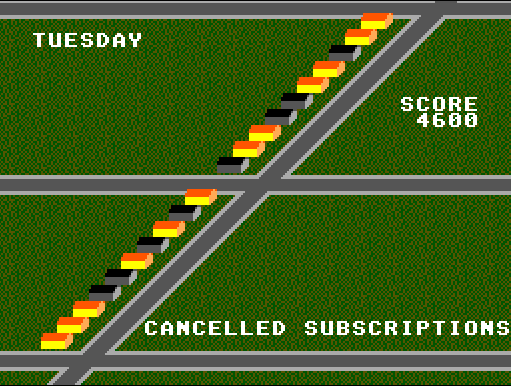
Cold-blooded…
On top of that pressure, people in the neighborhood really don’t want you to deliver those papers. Little kids on tricycles will try to knock you over, while older teens skateboard down the sidewalk towards you. Dogs chase you, motorcyclists run you down, grates stop you in your tracks. Even Death shows up on front lawns just to scare the crap out of you. If you crash once, you lose a life. Three crashes and your career is over.

Death works in mysterious ways.
Your goal is to make it through an entire week of work (Monday through Sunday) without losing all your subscribers or running out of lives. If you miss any of the homes on your route (or accidentally throw a paper through their front window), they’ll cancel their subscription on the next day. If, however, you deliver successfully to all subscribers, you’ll gain another subscriber on the following day. When you make it to the end of the day, an obstacle course where you throw papers at targets for extra points is your reward.

Better chug a Slice before you take on this course – it’s a doozy!
Success on your route depends on how well you can tame the Paperboy. Once he starts biking, he doesn’t stop for anything. The most you can get him to do is brake, which you’ll need to do often. Sharp brakes and swift turns are particularly essential for later stages when the aforementioned obstacles overflow onto your biking path. Sometimes an unexpected left turn into someone’s flowerbed is the only way to save yourself from a total wipeout.

Well, someone‘s getting their license revoked.
The Master System version is one of the better Paperboy ports you’ll find. The animation is smooth (shoutout to whoever animated Paperboy’s shirt flapping in the wind) and the colors are sharp, especially compared to the drab NES version. Paperboy’s controls do take some getting used to, but he can turn and brake on a dime when necessary. This version of the game also allows you to choose from three different difficulty levels. The harder the difficulty, the more ruffians the game puts in your way, the more points you’ll get for successful paper delivery. It’s a nice way to extend the length of an otherwise short game.

The Hard Way’s not for chumps.
Younger gamers may not be able to relate to the game’s bizarre depiction of neighborhood life, let alone the notion that teenagers were once hired, en masse, to deliver news to people’s doorsteps. For me, the game exudes a surreal nostalgia that reminds me of my own fragmented suburban upbringing – a thing that few games, save for powerhouses like Earthbound, can replicate. And even if you don’t have emotional ties to the game’s content, it’s enjoyable just to bike down the sidewalk at top speed while trying to land a paper in the mail slot. Paperboys certainly don’t run the world anymore, but Paperboy remains a classic.
B+
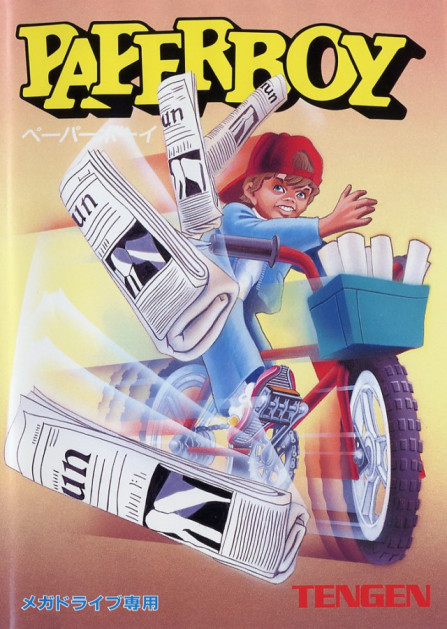
“Here’s what I think of your stupid headlines!”

Paperboy – ever the loose cannon – launches four papers at once.
You want to know what 8 extra bits of processing power will get you in the Genesis version of Paperboy? Gargled dialogue from the ‘boy himself. “Don’t tell my boss,” he mutters after crashing into someone’s car. “Just lost a customer…” he sighs after breaking a window. Silent all these years, and now that he can speak, remarks full of woe and regret.
16-bits also gets you additional rabble-rousers to bike around, including drunken businessmen who just got laid off, dudes fighting on the sidewalk Urban Champion-style, and hearses that block your path.

“Now now, boys, there’s no need to rumble! Have a paper, on the house.”
With all the exciting new neighbors, it’s a good thing that Paperboy doesn’t seem as anxious to deliver his papers as he did on the Master System. Rather than starting each day at full speed like in the latter, you begin slowly and pedal faster or brake depending on the situation. If you’re not moving forward or backward, you automatically cruise at a reasonable, less hurried pace. Perhaps this could be seen as making the game easier, but I appreciated the more laid-back approach

“Get Lost” mats are hard to find. That is one lucky homeowner.
I’m sure a poor adaption of Paperboy exists on some console or computer out there, but this is not it. Unless you hate scratchy, ennui-laden dialogue, or prefer reckless biking over careful cautiousness, Paperboy is just as fulfilling on the Genesis as it is on the Master System.
B+

All Paperboy needs is a right smack in the face and a little confidence.
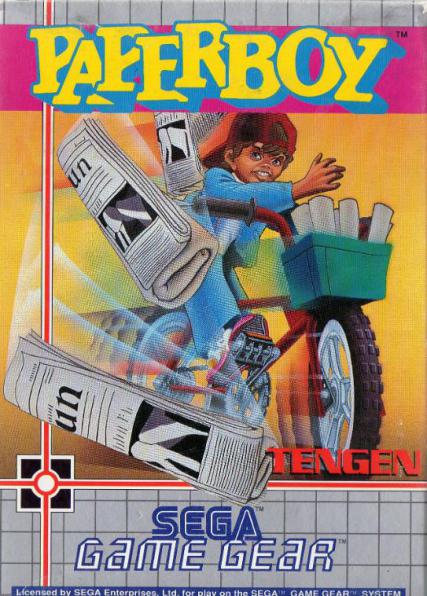
Where the rubber meets the ink.

George P. Benton, Esq. , relaxes with a hearty breakdance session after work.
One would think that Paperboy‘s already cramped ¾ viewpoint would suffer under the Game Gear’s small screen, but the game transitions to the handheld well. To account for the limited screen size, the game reduces the amount of enemies on-screen at any given time – a necessity, even though it makes the Easy difficulty even easier than the Master System and Genesis versions. Apart from this slight change, the Game Gear version replicates the Master System version in every way, from the improvised theme music to the looser controls. A surprisingly solid port.
B
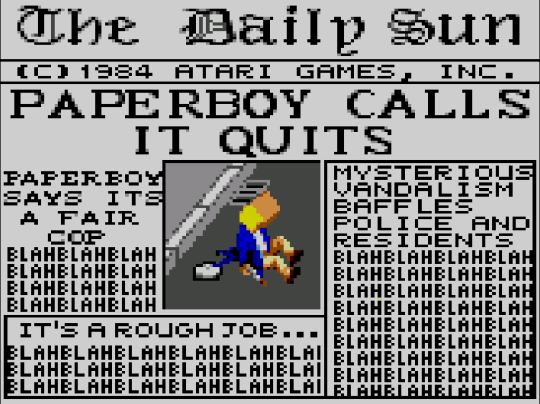
Would you look at all that fake news.
Advertisements Share this:




